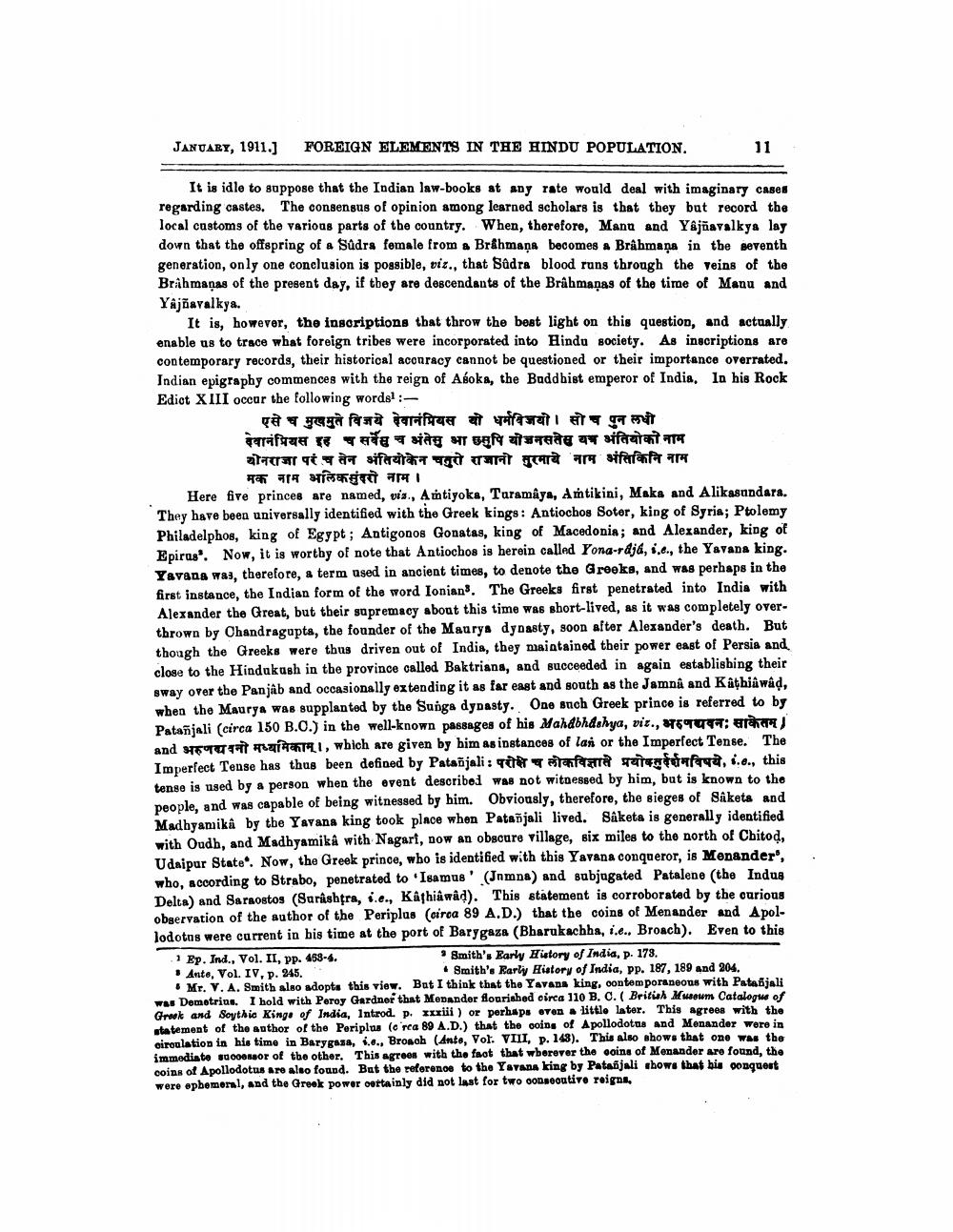________________
JANUARY, 1911.] FOREIGN ELEMENTS IN THE HINDU POPULATION.
11
It is idle to suppose that the Indian law-books at any rate would deal with imaginary cases regarding castes. The consensus of opinion among learned scholars is that they but record the local customs of the various parts of the country. When, therefore, Manu and Yajnavalkya lay down that the offspring of a Sûdra female from a Brahmana becomes a Brahmana in the seventh generation, only one conclusion is possible, viz., that Sûdra blood runs through the veins of the Brahmanas of the present day, if they are descendants of the Brahmanas of the time of Manu and Yajnavalkya.
It is, however, the inscriptions that throw the best light on this question, and actually enable us to trace what foreign tribes were incorporated into Hindu society. As inscriptions are contemporary records, their historical accuracy cannot be questioned or their importance overrated. Indian epigraphy commences with the reign of Aśoka, the Buddhist emperor of India. In his Rock Edict XIII occur the following words1:
एसेच मुखमुते विजये देवानंप्रियस यो धर्मविजयो । सो च पुन लधी
देवानं प्रियस इह च सर्वेषु च अंतेसु आ छसुपि योजनसते यत्र अंतियोको नाम योनराजा परं च तेन अंतियोकेन चतुरो राजानो सुरमाये नाम अंतिकिनि नाम मक नाम अलिक सुंदरी नाम ।
Here five princes are named, viz., Amtiyoka, Turamâya, Amtikini, Maka and Alikasundara. They have been universally identified with the Greek kings: Antiochos Soter, king of Syria; Ptolemy Philadelphos, king of Egypt; Antigonos Gonatas, king of Macedonia; and Alexander, king of Epirus. Now, it is worthy of note that Antiochos is herein called Fona-rajá, i.e., the Yavana king. Yavana was, therefore, a term used in ancient times, to denote the Greeks, and was perhaps in the first instance, the Indian form of the word Ionians. The Greeks first penetrated into India with Alexander the Great, but their supremacy about this time was short-lived, as it was completely overthrown by Chandragupta, the founder of the Maurya dynasty, soon after Alexander's death. But though the Greeks were thus driven out of India, they maintained their power east of Persia and close to the Hindukush in the province called Baktriana, and succeeded in again establishing their sway over the Panjab and occasionally extending it as far east and south as the Jamnâ and Kathiawâḍ, when the Maurya was supplanted by the Sunga dynasty. One such Greek prince is referred to by Patanjali (circa 150 B.C.) in the well-known passages of his Mahabhashya, viz., qua: archan and I, which are given by him as instances of lan or the Imperfect Tense. The Imperfect Tense has thus been defined by Patañjali: परोक्षे च लोकविज्ञाते प्रयोक्तुर्दर्शनविषये .., this tense is used by a person when the event described was not witnessed by him, but is known to the people, and was capable of being witnessed by him. Obviously, therefore, the sieges of Sâkets and Madhyamika by the Yavana king took place when Patanjali lived. Sâketa is generally identified with Oudh, and Madhyamika with Nagart, now an obscure village, six miles to the north of Chitoḍ, Udaipur State. Now, the Greek prince, who is identified with this Yavana conqueror, is Menander", who, according to Strabo, penetrated to 'Isamus' (Jnmna) and subjugated Patalene (the Indus Delta) and Saraostos (Surashtra, i.e., Kathiawâd). This statement is corroborated by the curious observation of the author of the Periplus (circa 89 A.D.) that the coins of Menander and Apollodotus were current in his time at the port of Barygaza (Bharukachha, i.e.. Broach). Even to this Smith's Early History of India, p. 173.
1 Ep. Ind., Vol. II, pp. 463-4. Ante, Vol. IV, p. 245.
Smith's Early History of India, pp. 187, 189 and 204.
Mr. V. A. Smith also adopts this view. But I think that the Yavana king, contemporaneous with Patanjali was Demetrius. I hold with Peroy Gardner that Menander flourished circa 110 B. C. ( British Museum Catalogue of Greek and Scythic Kings of India, Introd. p. xxxiii) or perhaps even a little later. This agrees with the statement of the author of the Periplus (e rca 89 A.D.) that the coins of Apollodotus and Menander were in circulation in his time in Barygaza, i.e., Broach (Ante, Vol. VIII, p. 143). This also shows that one was the immediate successor of the other. This agrees with the fact that wherever the coins of Menander are found, the coins of Apollodotus are also found. But the reference to the Yavana king by Patanjali shows that his conquest were ephemeral, and the Greek power certainly did not last for two consecutive reigns,




